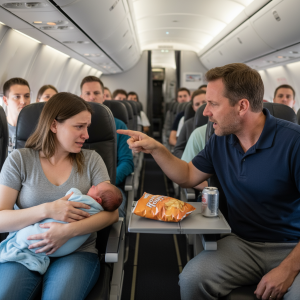Sometimes the smallest acts of compassion create the biggest miracles
Seven months into my pregnancy, my bank account read like a countdown to zero, and every trip to the grocery store felt like a strategic mission. That particular Tuesday evening, I clutched my carefully calculated shopping list, already mentally crossing off the “wants” to focus on absolute necessities. The fluorescent lights seemed harsher than usual as I navigated the aisles, my growing belly making every step feel heavier.
At the checkout line, I witnessed something that stopped me cold. An elderly gentleman stood ahead of me, his weathered hands trembling slightly as he methodically counted a small pile of wrinkled dollar bills. One by one, he began removing items from his modest haul—a can of soup, a loaf of bread, some crackers—all while keeping two bags of premium dog food firmly in his cart.
“Sir, you can’t have that animal in here,” the security guard said firmly, gesturing toward a small, scrappy terrier mix peeking out from beneath the man’s worn jacket.
The old man’s voice barely rose above a whisper: “She’s everything I’ve got left in this world.”
Something about that moment shattered whatever wall I’d built around my own financial worries. Here was someone choosing his companion’s wellbeing over his own basic needs, and I couldn’t just stand there watching. Without overthinking it, I stepped forward and handed the cashier my last twenty-dollar bill.
“I’ve got this,” I told the cashier, then turned to the startled man. “Please, let me help.”
The gentleman introduced himself as Graham—though he said most folks called him Gray—and his faithful companion as Pippin. His eyes filled with tears as he thanked me repeatedly, but honestly, it didn’t feel like anything extraordinary. It was just what you do for another human being when you recognize their need. As I walked to my car with my own meager groceries, I hoped that someday, when I really needed it, someone might extend the same grace to me and my soon-to-arrive baby.
The following morning arrived with an unexpected symphony of sounds outside my apartment—car doors slamming, multiple voices, the distinct rumble of a delivery truck. When I opened my front door, still in my pajamas and rubbing sleep from my eyes, I discovered what looked like Christmas morning had exploded on my doorstep.
A pristine Subaru Outback sat in my driveway, complete with an enormous crimson bow across its windshield. Stacked carefully on my porch were boxes upon boxes of groceries, packages of diapers in various sizes, baby bottles, blankets, and what appeared to be an entire nursery’s worth of supplies. Propped against my door was an envelope with my name written in careful, old-fashioned cursive.
My hands shook as I tore open the letter, and what I read inside left me completely breathless.
Gray explained that his late wife Marietta had started a beautiful but unusual tradition years ago. After experiencing tremendous kindness during her own difficult times, she would occasionally dress down and visit different stores, pretending to struggle financially. It wasn’t about deception—it was about testing whether genuine compassion still existed in a world that often felt increasingly cold and disconnected.
After Marietta passed away three years earlier, Gray had continued this ritual as a way to honor her memory and her unwavering belief in human goodness. The grocery store encounter had been one of these tests, and my willingness to sacrifice my last twenty dollars had proven his beloved wife right once again.
The letter went on to explain that the car, the supplies, and even a prepaid account worth several thousand dollars at the local grocery store were his way of paying forward the kindness I’d shown. But more than that, he wanted to ensure that my baby would arrive into a world where compassion was rewarded, not taken advantage of.
I sank onto my front steps, overwhelmed by the magnitude of what had just happened. What I’d considered a simple, instinctive act of human decency had somehow returned to me multiplied beyond anything I could have imagined. Through my tears, I realized I was holding more than just material gifts—I was holding proof that the universe still believed in rewarding those who choose kindness over self-preservation.
Months have passed now, and I’m just days away from meeting my daughter. Every time I buckle myself into that reliable Subaru, I think about Gray, about Marietta’s enduring faith in humanity, and about little Pippin who started this entire chain of events. I’ve learned that kindness isn’t just a nice gesture we make when it’s convenient—it’s an investment in a world we want our children to inherit.
The grocery account Gray set up has fed not just me, but several other struggling families in my neighborhood. I’ve discovered that generosity, like love, multiplies when shared rather than hoarded. What began as my last twenty dollars has become a reminder that we’re all connected in ways we rarely see, and that sometimes the most profound changes in our lives come disguised as ordinary moments of choice.
As I prepare to welcome my daughter into this world, I carry with me not just the material security that Gray’s generosity provided, but something far more valuable: the knowledge that kindness creates ripples that extend far beyond what we can see. My child will grow up hearing this story, understanding that compassion is never wasted, even when—especially when—it costs us something we think we can’t afford to give.
The twenty-dollar bill I gave away was my last, but it was also my first investment in the kind of world I want my daughter to know—one where strangers look out for each other, where generosity is rewarded, and where a small act of faith in humanity can change everything.
In a world that often feels divided, stories like this remind us that kindness is a universal language that transcends all barriers. Sometimes the most powerful gift we can give someone is simply the reminder that they matter.





